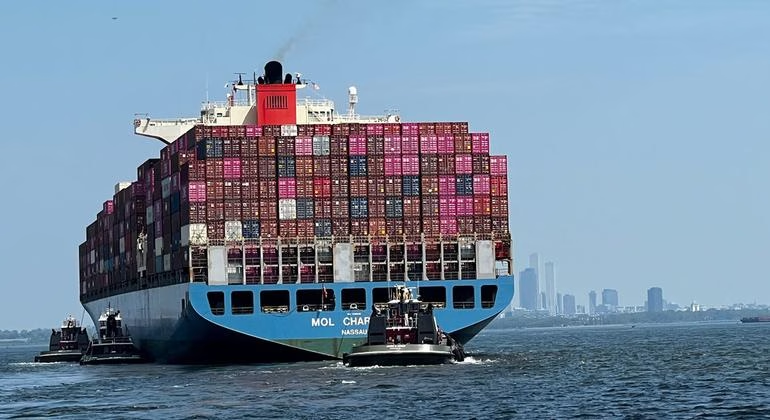Click here to download the image.
According to the UNCTAD’s Review of Maritime Transport 2025, which was launched in Geneva, seaborne trade volumes are predicted to rise only by 0.5 percent in 2025, the lowest rate in years, following a rapid expansion last year. This slowdown is occurring as geopolitical tensions, trade barriers, and climate pressures are transforming shipping routes, contributing to increased costs, and revealing weaknesses in the global economy.
UNCTAD Secretary-General Rebeca Grynspan emphasized the need for “just transitions” to zero carbon, digital systems, and new trade routes. She highlighted that these changes must empower, not exclude, and develop resilience, not vulnerability.
Shipping is responsible for over 80 percent of worldwide merchandise for export and import, making it a crucial indicator of global commerce. Crises in the Red Sea and ongoing tensions in the Strait of Hormuz have forced ships onto longer routes, leading to delays and increased costs. Vulnerable economies, including small island developing States, least developed countries, and net food-importing nations, are being disproportionately affected by these higher costs.
Global ports are also facing challenges such as congestion and the need for modernization. There is an urgent need for investment in digital systems and cybersecurity within maritime logistics. However, many developing countries continue to lag behind in digitalization.
The shipping industry’s greenhouse gas emissions increased by 5 percent in 2024, yet only 8 percent of the global fleet can currently use alternative fuels. The International Maritime Organization will consider a Net-Zero Framework in October, which includes a global fuel standard and carbon pricing mechanism. Fleet renewal and new fuel infrastructure are vital for reducing emissions.
Apart from trade flows and emissions, the report also emphasized the human toll. Cases of seafarer abandonment reached a record high in 2024, with crews being left stranded without pay or support. Amendments to the Maritime Labour Convention, which will come into force in 2027, will improve rights to repatriation and shore leave for seafarers, but effective enforcement is crucial.
To address these challenges, the review recommends that governments and industry collaborate on implementing stable trade policies, investing in sustainable infrastructure, promoting digitalization and cybersecurity, supporting vulnerable economies, and prioritizing fleet renewal and cleaner fuels.
Source: https://news.un.org/feed/view/en/story/2025/09/1165939






